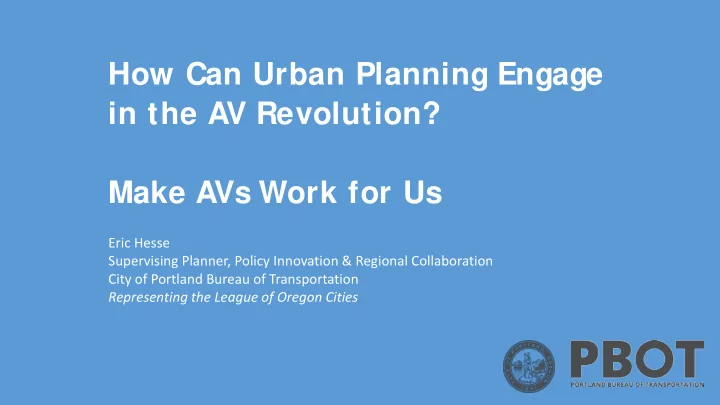

How Can Urban Planning Engage in the AV Revolution? Make AVs Work for Us Eric Hesse Supervising Planner, Policy Innovation & Regional Collaboration City of Portland Bureau of Transportation Representing the League of Oregon Cities
How can Urban Planning guide the A V Revolution? “Urban planning can be described as a technical and political process concerned with the welfare of people, control of the use of land, design of the urban environment including transportation and communications networks, and protection and enhancement of the natural environment.” (Wikipedia)
1. Articulate what is at stake with the Introduction of Automated Vehicles
A V: Greatest Disruption in 100 Y ears?
Automated Vehicles & Congestion Source: Fehr and Peers
2. Establish Clear Policy Outcomes and Long Range Plans to place A Vs in context and connect the dots between transportation and land use
S A VI: Goals-Based Policy AV’s should advance the outcomes/goals in Comprehensive Plan • Vision Zero : Prioritize Safety on our streets particularly for most vulnerable travelers • Health: Support active transportation and healthy communities • Economic Opportunity: Support local economic growth and great places • Equity: Ensure benefits accrue to disadvantaged people without increased burden • Congestion & Climate: Reduce burden on the transportation system and environment
Policy: Prioritize! F leets of A utomated V ehicles (that are) E lectric & S hared
3. Create A Clear Operating Landscape And Role For Local Agencies
Clear Federal, State, and Local Roles Federal Role • Vehicle safety testing and certification • Funding for state and local V2I and pilot projects State Role • Vehicle Registration • AV operations on state roads • Funding for V2I and pilot projects Local Role • AV operations on local roads (City Engineer authority) • Pilot projects • Managing Mobility Services
Getting Ahead: Portland’s S mart Automated Vehicle Initiative (S A VI) Mayor & Transportation Commissioner announced Portland’s Smart Automated Vehicle Initiative (SAVI) in April 2017 Invites AV Testing and Piloting in Portland Directed staff to prepare four elements: 1. Policy foundation 2. Request For Information (RFI) 3. Administrative Rule: framework for permitting, data collection 4. Public Engagement Strategy “We want to do AV right.”
What will determine the outcome? Policy & Actions Portland Administrative Rule and Permit Process Establishes clear path for AV test approval/permit • Requires a Permit for use of city streets • Establishes clear approval criteria • Requests basic info: what, when, where • Builds on TNC permitting framework • Lays out public engagement process (if needed) • Clarifies data reporting • Indemnifies City • Creates interim fee structure
Local Role: Managing A V Operations Tools • Street design • Parking • Pick-up and drop-off zones • Speeds • Freight loading and unloading • Efficiency incentives • EV charging • Smart V2I infrastructure • Technology on poles or in pavement • New maintenance requirements • Pricing
4. Measure Against Goals: Invest In the Good; Regulate the Bad
S A VI: Goals-Based Policy How do we assess the impact of specific AV proposals? Public Action Regulate Enable Partner Vision Zero Health Economic Opportunity Equity Congestion & Climate
Recommend
More recommend